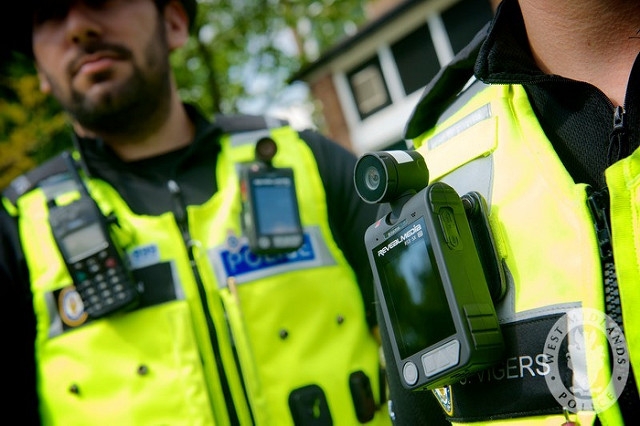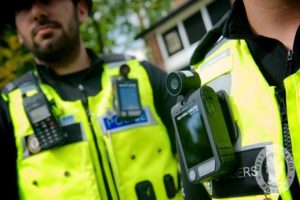
Police body cameras will be discussed at the event, a part of the Cyril H. Wecht Institute’s “Forensic Fridays” series, along with a pending bill in the state House.

Police body cameras will be discussed at the event, a part of the Cyril H. Wecht Institute’s “Forensic Fridays” series, along with a pending bill in the state House.
Brandon Addeo | News Editor
An event at Duquesne this Friday will discuss the balance between protecting privacy and protecting police investigations.
The Cyril H. Wecht Institute of Forensic Science and Law is hosting “Balancing Safety, Justice and Privacy: Body-Worn Cameras, Forensic Evidence and the Right to Know” Jan. 27 from 1 p.m. to 4:30 p.m. in the Power Center Ballroom.
The talk will cover the history of how police record encounters with suspects, current legislation regarding body camera use and “the competing interests of public safety, privacy and the ‘right to know,’” according to Ben Wecht, program administrator for the Cyril H. Wecht Institute.
Speakers at the event include Pittsburgh Police Cmdr. Clarence Trapp; Erik Arneson, executive director of Pennsylvania’s Office of Open Records and Duquesne Associate Law Professor John Rago, who helped draft a bill on body-worn cameras (BWCs) currently in the state legislature.
Pennsylvania Senate Bill 976, first introduced in 2015, seeks to change wording in the Wiretap Act — which makes recording an individual’s voice without their consent a third-degree felony — to protect police officers who capture audio in a private residence.
“Currently, the Wiretap Act does not permit officers to enter a private residence with an activated body-worn camera,” Sen. Stewart Greenleaf (R-Bucks), the bill’s primary sponsor, wrote in a 2015 memorandum to the Senate. “My legislation will permit officers to do so, because so much of their work involves responding to incidents taking place inside a residence.
“Measures can be taken to protect the privacy of the occupants of the residence, and the recordings will enhance any prosecution of wrongdoers inside the residence,” he added.
Wecht said SB 976 has many potential benefits.
“If passed, it is expected that this bill would create greater accountability by law enforcement agencies, more trust in policing and government by private citizens and the media and more solid evidence in the adjudication of criminal and civil complaints,” he said.
SB 976 passed the state Senate 45-5 on Oct. 19, and is now being considered by the House of Representatives. The state House is also considering objections to the proposed bill from members of the media and the American Civil Liberties Union (ACLU), who took issue with the “current near-impossibility” for members of the public to access audio and video from body-worn cameras, according to Wecht.
According to the bill, citizens will not be able to access audio and video recordings under Pennsylvania’s Right to Know Law. Instead, a requestor must make a written request to the police department in possession of the recordings for access to footage. If police deny the request, the individual can petition a common pleas court for access.
In a request, the person requesting footage must prove it is not part of an ongoing investigation, the footage would be available under Right to Know Law standards and the public’s interest in disclosure outweigh the government’s reasons for nondisclosure.
Andy Hoover, legislative director of the ACLU of Pennsylvania, said this process is flawed.
“Video data that documents incidents that are legitimately in the public interest such as arrests, use of force by an officer, or disputes between an officer and a resident will be nearly impossible to obtain, even if the requester is in the video,” Hoover wrote in an Oct. 18 memorandum to the state Senate.
BWCs are already being used in Pittsburgh.
Pittsburgh Police use about 100 body cameras currently, according to spokeswoman Emily Schaffer.
“We do have plans to increase the use of BWCs in the future,” Schaffer said. “Contingent on changes in the state law, we plan on adding 400 to 500 more.”



